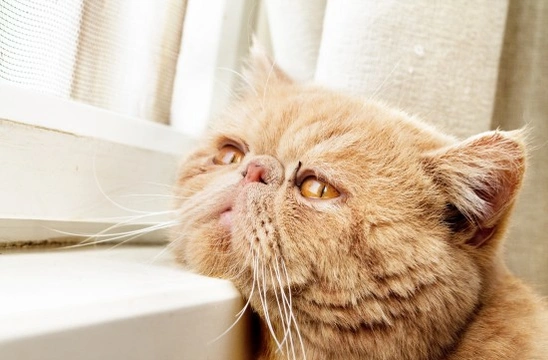Pets
Pets for studWanted petsBreedersAccessories & services
Knowledge hub
Support
Support & safety portal
Common Emergencies You May Have to Deal with in an Older Cat
It's never nice when pets are sick but it's really important to know when things might be terribly wrong and therefore must be considered as an emergency situation. The rule of thumb is that if you have any doubts you need to get your pet to the vet as soon as you can. Below are a few conditions that older cats are prone to suffer from and which should be considered as emergencies which require veterinary attention as quickly as possible.
Difficulty Breathing & Coughing
If you notice your cat is experiencing real trouble breathing there could be something serious going on. However, with this said any difficulty in breathing no matter how mild has to be taken seriously. A vet would normally want to take a few X-rays of your pet's chest to assess what's going on in their lungs as well as their airways.
When it comes to coughs, the symptoms are rather vague because there are several things that could be going on. This includes some type of virus, bacteria infection or it could be fungal pneumonia or allergic bronchitis. A cough could also be a symptom of congenital heart disease. As such you would need to get your pussy cat to the vet for a correct diagnosis to be made earlier rather than later.
Diarrhoea & Vomiting
Bothdiarrhoea and vomiting can be caused by a variety of things including a sudden change in your cat's diet. However, both conditions could also be caused by internal parasites or maybe your cat has ingested something that doesn't agree with them. You should never rule out toxins as a cause because there are many common household products that contain things that are extremely poisonous to our feline friends. With older cats, they will dehydrate very quickly which in turn will be a tremendous amount of pressure on their kidneys and liver and these internal organs may already be weakened through age.
Trauma
As cats reach their senior years they are nowhere as agile as they once were. As such the chances of them suffering some sort of trauma and injury is far greater. If they are an outdoor cat, you may also find they get picked on by other younger cats in the neighbourhood. The problem is that as with humans, if bones get broken they will take longer to mend and if there is any internal bleeding it may be life threatening. Older cats just cannot cope as well as younger cats would be able to simply because everything has slowed down which makes recovery that much harder for them. If you think your cat has suffered some sort of trauma, the quicker you get them to the vet, the better chance they have of recovering.
Allergic Reactions
As cats get older, they can develop allergic reactions to things which could include a simple insect or a sensitivity to a vaccine they have never had a problem with in the past. One of the most serious forms of allergic reactions seen in cats is an anaphylactic one. The symptoms include the following:
- Vomiting
- Diarrhoea
- Lethargy
- Difficulty in breathing
- Collapse
A cat suffering an allergic reaction to something may experience obvious facial swelling, itchiness and hives as such they would need immediate veterinary attention to make them more comfortable and to start a course of treatment to get the allergy under control.
Seizures
When a cat experiences a seizure there is abnormal electrical activity going on in their brains and it can be triggered by a variety of things including epilepsy, tumours or swelling in the brain which are all intra-cranial issues. However, there are extra-cranial problems which could trigger a seizure too and this includes low blood sugar, abnormal levels in electrolytes to name but two. Whatever the trigger, seizures are potentially life threatening episodes and as such your cat would need to be taken the vet as a matter of urgency.
Difficulty Urinating
If you notice your cat has real trouble urinating, this is a sign there might be more going on than just a urinary infection. A lot of the time this is caused by having crystals or stones which have formed in their bladders. Other causes include the following:
- Inflammation
- Certain forms of cancer
- Stress
- Blood clots
If your cat cannot pass any urine, this is an extremely dangerous situation which is life threatening as toxins will be building up in their bodies and as such veterinary attention should be sought as a matter of urgency.
Pain & Discomfort
As your cat gets older the chances are they will start to feel a few aches and pains associated with age. If you notice your pet is showing any of the following symptoms you should take them to see the vet as soon as you can:
- Pacing around and not settling
- Agitation
- Restlessness
- Panting
- Rapid heart beat
- Aggression
All too often arthritis is the cause of a lot of discomfort in the older cat and as such you may like to discuss the problem with your vet who would recommend putting them on some form of treatment. You may find your vet recommends a change of diet which would have to be done slowly to avoid any digestive issues from occurring.



